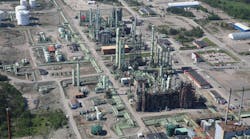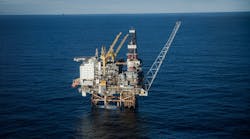The oil market is likely to experience a price crisis this winter; stock cover is still high, but it will take a big tumble in the second half of 1999.
This rosy outlook for oil producers came from London's Centre for Global Energy Studies in late August, when CGES also said that it is in the interests of the members of the Organization of Petroleum Exporting Countries to boost output sooner rather than later.
"The market," said CGES, "must be expecting an alarming decline in stock cover from the third quarter 1999 onwards for it to have become backwardated right now. Meanwhile, OPEC is saying that its cuts will continue until March 2000. On current indications, the oil market is thus heading for a price explosion this winter, and only OPEC can prevent this, by reversing its policy of output cuts."
With Brent for October delivery trading at nearly $22/bbl at the close of business on the International Petroleum Exhange Sept. 7, and October-delivery Nymex crude fetching $22.75 midday Sept. 8, CGES's predictions appear to be well-founded.
The analyst reckons that worldwide inventories will begin to decline at a "fierce" rate of 2.1 million b/d in the second half of 1999. So far, only gasoline stocks have been withdrawn, but as refinery runs pick up crude oil stocks also are expected to be tapped.
"The zero stock-change call on OPEC in second half 1999," said CGES, "will exceed OPEC's output by 2 million b/d, putting severe upward pressure on prices.
"OPEC has over-achieved its objective of raising oil prices from the depths; surely it should now consider easing the pressure on prices before it damages its own longer-term prospects."
CGES said OPEC should boost its combined output by 2 million b/d when it meets in Vienna in late September, with the actual date of implementation to be determined by market conditions and not to be preset.
"Of course, it is not just OPEC's decision makers who will influence the price of oil in the months ahead," said the analyst. "The rise in prices since January has already begun to have an effect on inflation, and this will temper future oil demand growth. At the same time, higher prices have improved the prospects for non-OPEC output."
While the Brent price is well above $20/bbl, the average for the year is still less than $15/bbl, and stocks remain plentiful, argues CGES. This provides little incentive for OPEC ministers to announce production increases.
"Should they not take the opportunity of doing so in Vienna, prices will continue to strengthen over the winter, with dated Brent averaging $23/bbl in the first quarter (of) 2000.
"A 2 million b/d output increase in April would begin to take some of the heat out of the market, but the quarterly average price of dated Brent would not dip back below $20/bbl until the fourth quarter (of) 2000, yielding an average price in 2000 of $20.70/bbl."

